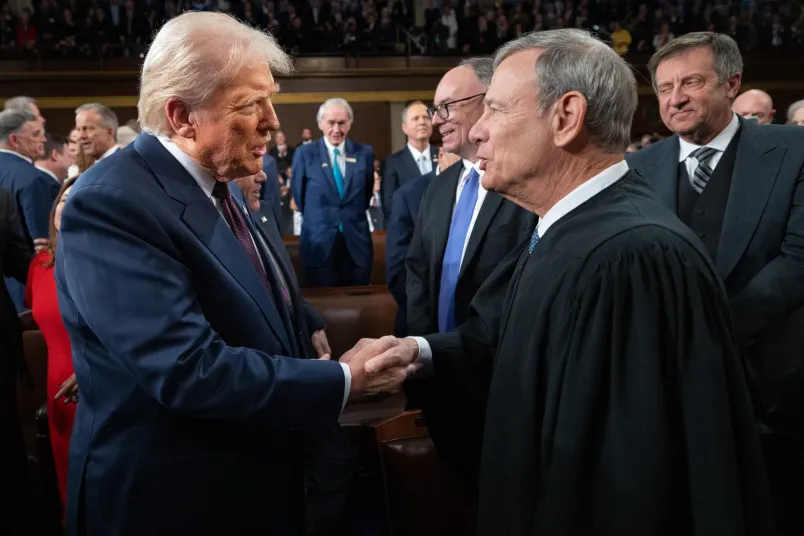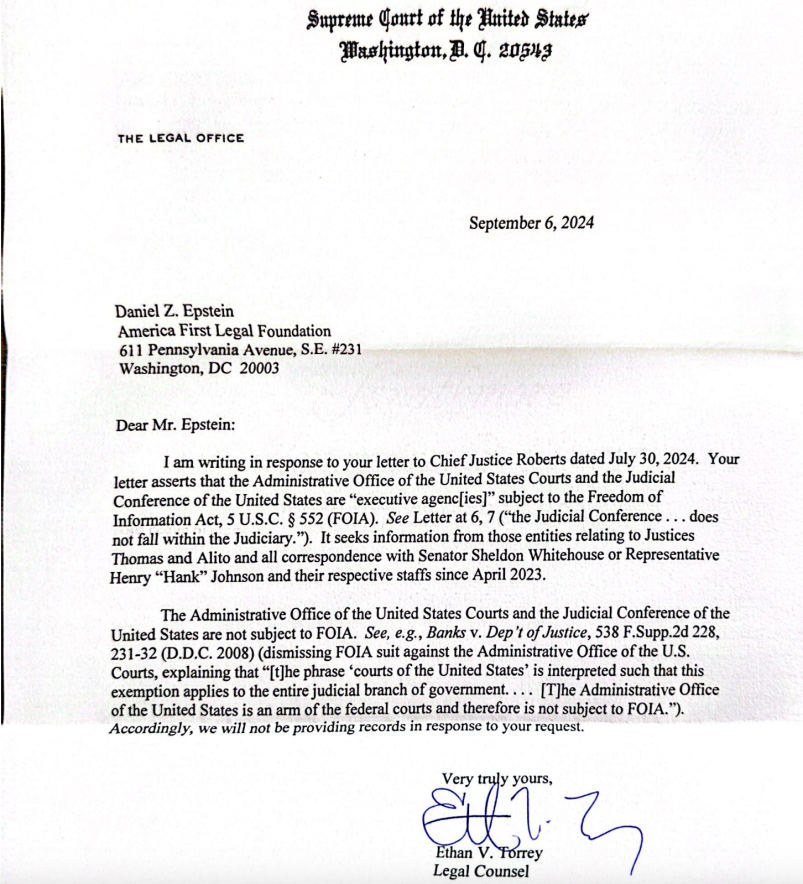Magats_Love_NHB
Let It Burn!
Trump Allies Sue John Roberts To Give White House Control Of Court System
A think tank founded by Stephen Miller sued Roberts and the office that administers the judiciary, claiming that the White House should run the federal courts.
Trump Allies Sue John Roberts To Give White House Control Of Court System
Close allies of President Trump are asking a judge to give the...
talkingpointsmemo.com
Close allies of President Trump are asking a judge to give the White House control over much of the federal court system.
In a little-noticed lawsuit filed last week, the America First Legal Foundation sued Chief Justice John Roberts and the head of the Administrative Office of U.S. Courts.
The case ostensibly proceeds as a FOIA lawsuit, with the Trump-aligned group seeking access to judiciary records. But, in doing so, it asks the courts to cede massive power to the White House: the bodies that make court policy and manage the judiciary’s day-to-day operations should be considered independent agencies of the executive branch, the suit argues, giving the President, under the conservative legal movement’s theories, the power to appoint and dismiss people in key roles.
Multiple legal scholars and attorneys TPM spoke with reacted to the suit with a mixture of dismay, disdain and laughter. Though the core legal claim is invalid, they said, the suit seems to be a part of the fight that the administration launched and has continued to escalate against the courts over the past several months: ignoring a Supreme Court order to facilitate the return of a wrongly removed Salvadoran man, providing minimal notice to people subject to the Alien Enemies Act, flaunting an aggressive criminal case against a state court judge.
The executive branch has tried to encroach on the power of the judiciary in other ways too, prompting a degree of consternation and alarm unusual for the normally-staid Administrative Office of U.S. Courts. As TPM has documented, DOGE has already caused disorder at the courts and sent out mass emails to judges and other judiciary employees demanding a list of their recent accomplishments. Per one recent report in the New York Times, federal judges have expressed concern that Trump could direct the U.S. Marshals Service — an executive branch agency tasked with protecting judges and carrying out court orders — to withdraw protection.
These are all facets of an escalating campaign to erode the independence of the judiciary, experts told TPM. The lawsuit demonstrates another prong of it: close allies of the president are effectively asking the courts to rule that they should be managed by the White House.
“It’s like using an invalid legal claim to taunt the judiciary,” Anne Joseph O’Connell, a professor at Stanford University Law School, told TPM.
“To the extent this lawsuit has any value other than clickbait, maybe the underlying message is, we will let our imaginations run wild,” Peter M. Shane, a constitutional law scholar at NYU Law School, told TPM. “The Trump administration and the MAGA community will let our imaginations run wild in our attempts to figure out ways to make the life of the judiciary miserable, to the extent you push back against Trump.”
A FOIA from America First
The America First Legal Foundation filed the suit on April 22.It came after the group first filed a FOIA request in July 2024 to the Judicial Conference of the United States and the Administrative Office of U.S. Courts asking for “all records referring or relating to (1) Clarence Thomas or (2) Samuel Alito” and all communications with Sen. Sheldon Whitehouse (D-RI) and Rep. Hank Johnson (D-GA), starting in April 2023. Both Democrats have led investigations into the influence of wealthy political donors’ money on the court, the conservative legal movement’s long-term plan to capture the high court, and alleged ethical violations by Justices Thomas and Alito. The Judicial Conference, which is composed of senior federal judges and operates via an array of committees, sets policy for the judiciary.
Ethan V. Torrey, legal counsel of the Supreme Court, rejected the request in a September 2024 letter, per an exhibit filed along with the complaint.

Daniel Z. Epstein filed the FOIA request, and is listed as lead attorney on the lawsuit. Epstein currently represents President Trump in his personal capacity in the lawsuit against CBS over an October 60 Minutes interview with Kamala Harris.
Stephen Miller, the longtime Trump aide, founded the America First Legal Foundation in April 2021, describing it as the “long-awaited answer to the ACLU.” Over the next few years, the group succeeded in slowing down or blocking several Biden administration policies, often by filing in the Northern District of Texas’s Amarillo courthouse, which is presided over by a judge who is notably receptive to conservative arguments. Its priorities often match those of Trump’s second term; it attacked diversity programs, protections for LGBT students, immigration, and supposed “wokeness” in corporate America. Miller himself has been a public driving force in the most aggressive and lawless elements of the second Trump administration’s effort to bulldoze through civil liberties in the name of increasing the tempo of deportations.
America First Legal did not return TPM’s request for comment.
When the suit was filed in April, it received a small round of coverage that focused on FOIA element of the claim.
Legal experts suggested to TPM that the FOIA piece is something of a trojan horse. The Judicial Conference and Administrative Office’s denial of the FOIA request provides standing to sue, and thereby ask a federal judge to declare that the two judicial bodies “are subject to the FOIA as independent agencies within the executive branch.”
In terms of importance, a judge finding that core parts of the judiciary are independent agencies of the executive branch would dwarf any FOIA material America First Legal might receive. The lawsuit itself seems to acknowledge this. At one point, in language channeling that of a protection racket, America First Legal observes that “Federal courts rely on the executive branch for facility management and security. Federal judges, as officers of the courts, need resources to fulfill their constitutional obligations.”
New extreme for an old theory
There is a level of irony here.For years, conservative legal scholars have pushed the idea that power in the executive is unitary, granting the President the ability to exert direct control over all federal officials who carry out federal law. It opens the door to a level of presidential power that hasn’t been seen until this administration, and which the Supreme Court may ratify this term.
This lawsuit asks the judiciary to extend that logic to its own operations, potentially dealing a fatal blow to judicial independence.
This argument reaches a provocative peak when it comes to the Judicial Conference of the United States. There, the Chief Justice of the Supreme Court can appoint members to committees. The lawsuit says that this means Roberts may, at times, fall under the President’s power — for FOIA purposes, of course.
“Accordingly, if the Chief Justice does indeed have this power to appoint officers, then he must be acting as an agency head, subjecting the Judicial Conference to the FOIA,” the suit reads.
Melissa Murray, a professor at NYU Law, pointed out that the suit raises a number of bizarre scenarios. If it makes it to the Supreme Court, “does the Chief Justice have to recuse himself?” she asked.
“It does seem like poking the bear,” she added.
As of this writing, lawyers for Roberts and the U.S. Courts director have not appeared on the docket. In other cases filed against parts of the judiciary, the Justice Department’s Civil Division has appointed attorneys.
The DOJ did not return a request for comment. The Administrative Office of U.S. Courts declined to comment. The Supreme Court also did not return requests for comment.
This doesn’t necessarily mean that federal courthouses will soon start serving Trump steaks, or that Kid Rock will be called on to provide filler sound during sidebar sessions.
Blake Emerson, a professor at UCLA Law, called the suit’s claims “outlandish,” and said that if it somehow succeeded, it would grant the White House control over “the means by which the judicial branch functionally operates.”
O’Connell, the Stanford Law Professor, described it to TPM as more of an attempt to tell a story about “how much power they think the executive should have” than a serious legal claim.
“There is no chance that this will prevail,” she said.
Read the lawsuit here:
